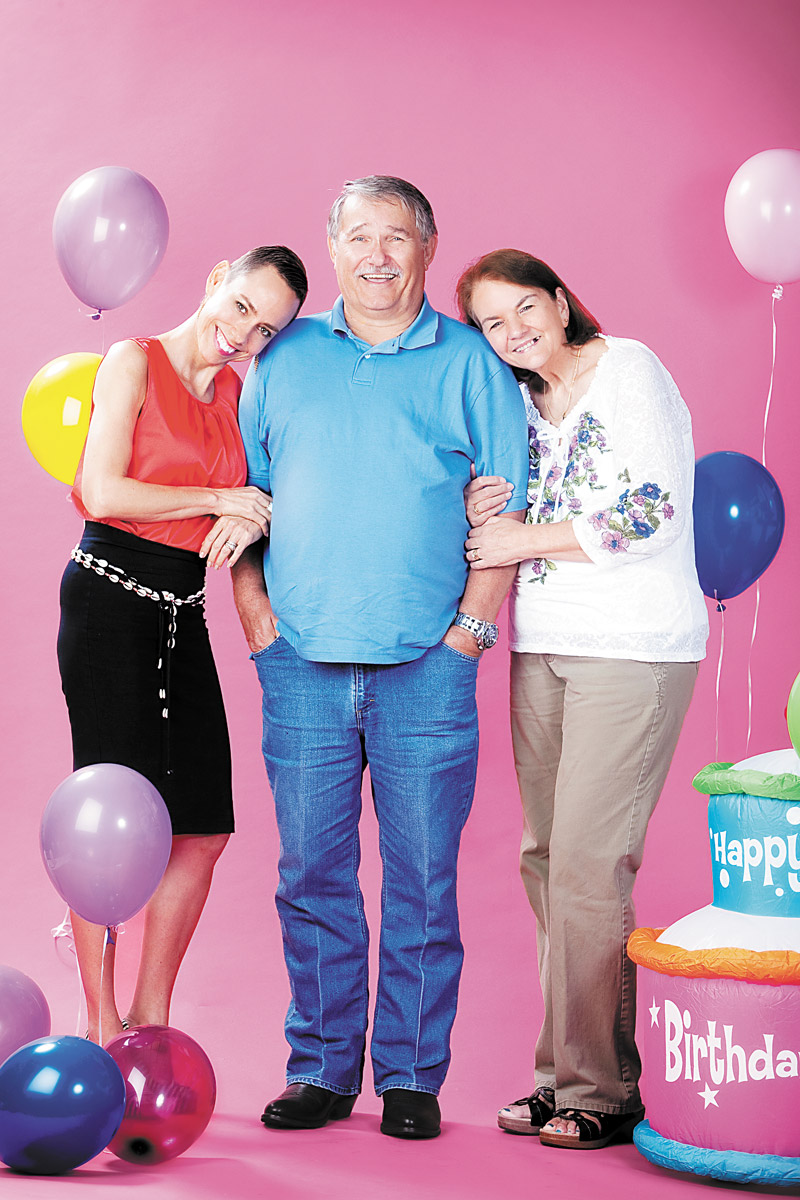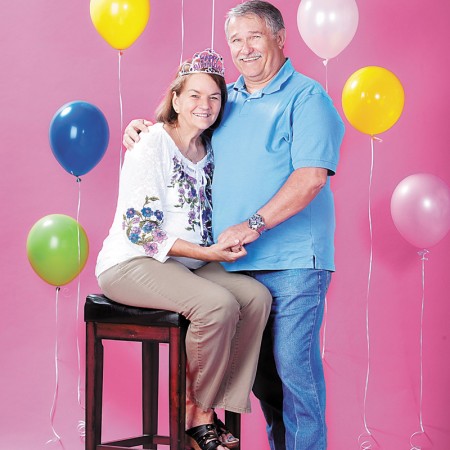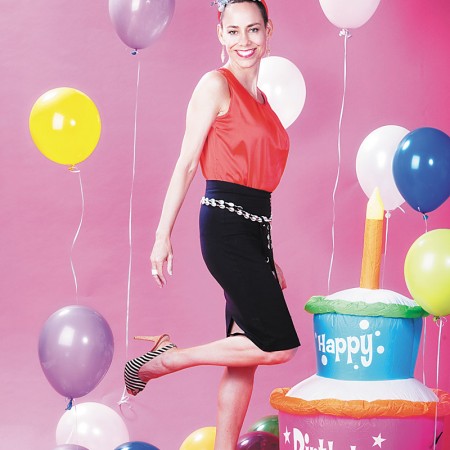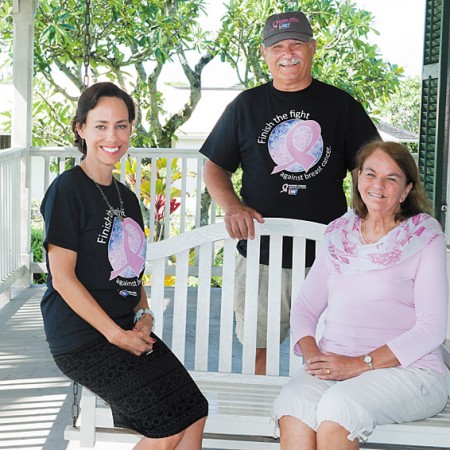Beating Breast Cancer (Yes, men get it too)
‘MidWeek’ sits down with breast cancer survivors — including a husband-wife duo who both beat it — and comes away inspired by their positive outlooks
Cancer survivors say the darndest things. Like Melissa Howard, mother of two, endurance athlete and former Hawaii News Now account executive, when asked about what her hyper-aggressive type 2 A triple-negative breast cancer meant to her: “It was the best thing that could ever happen to me.”
Or Dennis and Pam Shewell, a married couple who together have contracted not two, not three, but four different cancers at four different times, when asked how they feel about their fortunes and they instantly and in unison replied: “Lucky!”
If these seem like odd responses, it is perhaps because you have never looked at life from their perspective, an outlook that is formed while lying alone on radiation tables, playing a game of chicken with your body and the invaders inside you.
Pam Shewell got advice from her physician sister on how to fill those lonely minutes supine with only your thoughts for solace.
“She told me, when you are lying there on the radiation table by yourself, you have to tell that cancer to go away, ‘Beat that cancer, beat that cancer, beat that cancer,'” says Pam. “It got to where I could tell how many times I could say it before the radiation was done. You have to have a positive attitude.”
It is that attitude and their experiences that bond this year’s American Cancer Society’s Portraits of Hope selections together as they help raise awareness and resources to battle their common enemy during Breast Cancer Awareness Month.
It culminates with the Making Strides 5K fundraiser Oct. 24 that starts at Richardson Field and crosses the bridge to Ford Island. Registration is still open for individuals or teams to participate.
- Pam and Dennis Shewell ACS PHOTOS
- Melissa Howard ACS PHOTOS
- They share one thing in common: They beat breast cancer NATHALIE WALKER PHOTO
ACS currently has $86 million invested in grants fighting the disease, and countless volunteer hours spanning needs from simple rides to and from the clinic, to navigating the health care system, to managing the appearance-related side effects of treatment.
Yet despite the size of the war chest it is assembling against breast cancer, which more than 230,000 American women will be diagnosed with this year, the best weapons in their arsenal are the survivors themselves and the attitudes they project.
Take Howard — she would be the perfect candidate to fall into the “Why me?” morass. The picture of health, she was spokeswoman for the local Spartan Race and her idea of a good workout was one where you felt physically ill at the end of it.
As she was recovering at home on the couch from the grueling challenge of last year’s race, she noticed an itching sensation in her left breast. Three doctors and an ultrasound later, and the unlikeliest of results and her worst fears were confirmed.
“It was awful,” says Howard, who now is cancer-free. “It was the hardest thing I have ever been through, but it was the best thing that could ever happen to me. It was life-changing in many good ways. I am not the same person I was before. I do not believe in negativity. I believe it happened for a reason, and I feel blessed every day.”
It seems incongruent to have something so horrifying serve as the best thing in your life. Because of her physical fitness, the doctor recommended a very aggressive treatment, blasting her with high levels of chemotherapy every other week for six months.
Gone were her long hair and toenails. What was left was a shell of the athlete she always had been, and she had taken on, in her words, the appearance of a concentration camp victim. But despite the degradation to her physical exterior, the woman inside was growing in ways she never knew she could.
“Before this, my priorities were screwed up. Money was everything. My career was so important — I judged myself by how successful I was,” admits Howard. “I was an extremist. I worked out until I felt sick or else it wasn’t a workout. I was really hard on myself and now I am much gentler on myself.”
That is not to say her thoughts were always rosy. There were dark moments spent alone when the kids were out and her husband was working, and those were the times when ACS and its Reach to Recovery program would help bring her out of the shadows.
“I would get a call out of the blue, and you would talk to the volunteers, and I would be, like, ‘Can I just hold your hand for the rest of the day? Can you come to my house because you are awesome?'” says Howard with a smile.
“It just gave me a piece of familiarity with someone who has been there. When you can talk to someone and laugh about it with them, the commonality gives you strength. My husband could always tell when I had gotten a call, and that is why I want to do this, to help support other women and men. It is a special club. It is not a club you want to be in, and I think they are some of the strongest people I have ever met.”
Like Kauai’s Portrait of Hope Gini Martin, whose relationship with ACS began before she was ever diagnosed, as her mother had the disease and she wanted to help fight it any way she could. She is Relay for Life team captain for the Crab Conquerors, a nod to the astrological sign. In her second year of racing, she found out she also had developed breast cancer.
Living on a Neighbor Island meant commuting every day to Oahu for treatment while still trying to run her Merry Go Round preschool in Kapaa.
“Whether it was airline tickets, hotel rooms and, now, the Hope Lodge, ACS has always been there for me, and they are there for everybody who wants to use them. I am a big advocate for them,” says Martin, who has been cancer-free since 2004 but still organizes fundraisers for ACS on the Garden Isle.
The couple forced to use it the most may be the Shewells, whose first go-round with cancer was in 1990, when Pam found out she had Hodgkin’s disease. She had to head to Stanford for treatments, leaving her electrician husband to take care of their two teenage sons for three months.
Having successfully beaten that back, the next year Pam discovered she had breast cancer.
“The only good thing was my medical team was already in place,” she says with a laugh, but she also knew that ACS would be there to provide the emotional support needed.
“You can talk to somebody or they can talk to you, but unless they have walked in your shoes, they kinda sorta know but they don’t really know what you are feeling — the ‘why me’s,’ the denial and all of that. We just feel it is good to get a positive message out there. Not everybody survives, that is the bare-bones fact, but if you do survive, then you need to make it positive for everybody else through the process.”
She has helped be that positive influence through ACS, and was then prepared when it was time to switch roles from patient to caregiver, as her husband was diagnosed with prostate cancer in 2002, and then in 2010 with rare but deadly breast cancer for men.
“We were getting ready to go out for Valentine’s Day, and I felt this little shock in my breast,” says Dennis, who often uses electrical metaphors because of his former profession. “There was a lump under my nipple. When I was diagnosed with breast cancer, it was a real shocker.”
It was originally diagnosed as a cyst, but Dennis stayed after the doctors because of his experience with his wife’s battles, and a fortunate encounter he had two decades prior with a carpenter who had a double mastectomy because of his male breast cancer.
Breast cancer occurs in men at a much lower rate, only about 2,300 cases were diagnosed this year, but because of a lack of knowledge in the community about it, it can often go undetected or misdiagnosed — casualties include former Advertiser drama critic Pierre Bowman.
“I tried to stay positive the whole time. It seemed to keep me going. There was a point in the chemo where I was a bear to live with — I won’t use the word my wife used to describe me — but we always had support from the ACS, and it wasn’t a good thing but I felt good for what they did,” says Dennis, who has been cancer-free since 2010.
Despite all the misfortune over the past two decades, the Shewells continue their confoundingly cheerful outlook on life and the suffering they have endured.
“It is kind of a bummer to be diagnosed with cancer, but we have had so much positive around us,” says Pam.
“We felt a real need for paying it forward. They were there when we needed it, and we want to make sure it is there when others need it.”
To sign up for the Oct. 24 American Cancer Society Making Strides 5K, go to makingstrides.acsevents.org/honolulu.










